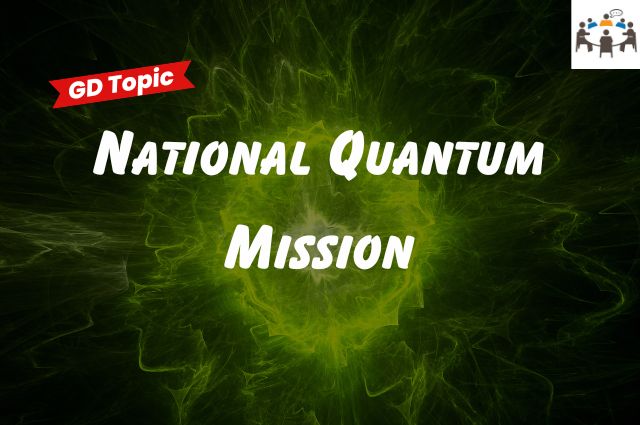Theme:
- Launched on April 19, 2023, the National Quantum Mission (NQM) is a significant step forward for India’s scientific and technological development. With a budget of Rs 6,003 crore and a timeline of 2023 to 2031, the mission aims to accelerate the development and adoption of quantum technologies in India and to make the country a global leader in the field.
What is Quantum Technology?
- Quantum technology is a category of advanced technology that operates based on the principles of quantum mechanics, such as quantum entanglement and superposition. While the technical details may seem complex, it’s important to note that everyday devices like our smartphones make use of quantum technology without requiring us to understand the intricacies of quantum mechanics. Some more examples of everyday technologies that make use of quantum principles are MRI machines, LED lights, laser scanners, and GPS.
Purpose of National Quantum Mission (NQM):
- The NQM aims to initiate, nurture, and scale up scientific and industrial research in the field of quantum technology. This involves the development of quantum computing, quantum communication, quantum sensors, and other quantum-based devices.
- The NQM is also helping to create special materials that are needed to build these quantum devices, like superconductors. These materials are essential for making quantum computers, communication devices, and sensors.
- It’s working on making communication very secure, so people can send sensitive information without worrying about others spying on it. This is crucial for data security and privacy.
- The NQM wants to develop super-precise sensors for various uses, like in healthcare, checking the environment, and mineral extraction. These sensors are much better at accuracy and sensitivity compared to regular ones.
- India wants to be a leader in the world of quantum technology. The NQM aims to put India at the forefront of quantum applications, not only in healthcare and defence but also in fields like energy and diagnostics.
Challenges:
- Research and development in quantum technology require a lot of money. It’s a challenge to secure continuous and substantial financial support for quantum projects from both the government and private sector.
- It is very difficult and costly to build and maintain the necessary infrastructure for quantum computing, such as super-cold cooling systems and specialized networking equipment.
- Quantum technology is a long-term effort. Keeping the mission going over many years, even when politics and priorities change, is a big challenge.
- Quantum technology needs experts in quantum physics, quantum computing, and quantum materials. Attracting and keeping these highly specialized professionals is tough, as there’s strong global competition for their expertise.
Conclusion:
Quantum technologies hold immense promise for revolutionizing various fields and addressing critical societal challenges. India’s National Quantum Mission is a commendable initiative that aims to propel the country into a leadership position in this rapidly growing field. By fostering research, development, and application of quantum-based technologies across various sectors, India can reap significant scientific, economic, and technological benefits. However, overcoming the technical, financial, and societal challenges associated with quantum technology development requires a concerted effort from the scientific community, governments, and industry. With sustained investment and collaboration, quantum technologies have the potential to transform our world, leading to advancements in healthcare, materials science, artificial intelligence, and beyond.
Your Turn…
What are your thoughts on the National Quantum Mission? Express your views through the comment section below. Subscribe to our blog to read answers to the trending GD topics.
References:
Copyright @ Group Discussion Ideas.

